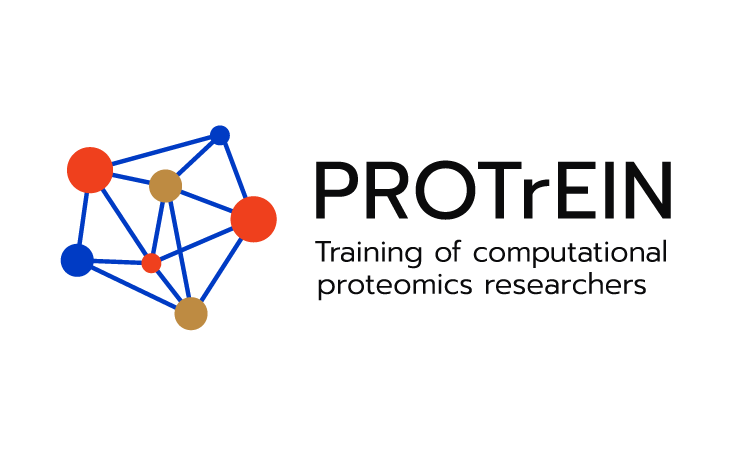 CRG/UPF Proteomics Unit
CRG/UPF Proteomics Unit
CRG/UPF Proteomics Unit
CRG/UPF Proteomics Unit
Overview
The Proteomics Unit is a joint effort of the Universitat Pompeu Fabra and the Center of Genomic Regulation to create an innovative research infrastructure with a high-level of excellence and sustainability to support scientists in the biomedical field. The activities of the Proteomics Unit are focused onto the provision of high-quality proteomics services with strong added-value to the research community by i) offering state-of-the-art methods, advise and expertise to support basic and translational researchers; ii) developing new methods and techniques that keep the unit up to date and at the forefront of the proteomics field; and iii) training the community and actively disseminating proteomics science and methods.
The Proteomics Unit is part of the Spanish National Infrastructure for Omics Technologies (ICTS OmicsTech) and the European Proteomics Infrastructure Consortium (EPIC-XS, GA 823839), and it coordinates the European innovative and interdisciplinary Research and Training network PROTrEIN (GA 956148). The Proteomics Unit is also part of the "Plataforma de Recursos Biomoleculares y Bioinformáticos - ProteoRed" of the Instituto de Salud Carlos III, part of the Spanish National Health System (PT17/0019 ).
You can learn more about the unit by taking the virtual tour HERE.
Latest Updates
State-of-the-art infrastructure to speed up protein analysis in Catalonia (30/06/2021)
The Centre for Genomic Regulation (CRG) has teamed up with several leading hospital research institutes in Catalonia to create a new state-of-the-art infrastructure for the study and analysis of proteins.
Boosting machine learning skills to speed up proteomics research (21/12/2020)
The CRG, together with ten other European partners, will start a new programme to train a new generation of researchers with the latest machine learning and data visualization skills to boost this burgeoning research field.
Mysterious ancestor finds new place in humanity's family tree (02/04/2020)
The Proteomics Unit of the Centre for Genomic Regulation (CRG) and Universitat Pompeu Fabra (UPF) has played a vital role in the analysis of an eight hundred thousand-year-old human fossil.
A new tool that makes it possible to adapt treatment for patients with cardiogenic shock has been developed (17/06/2019)
Cardiogenic shock is a possible complication of serious heart attack involving an associated mortality rate of approximately 50% of all cases
A molecular connection between nutrient availability and embryonic growth has been identified (06/03/2019)
Investigators of the CRG discover that AHCY, a nutrient metabolism sensor protein, is a direct activator of the genes involved in the proliferation of embryo stem cells
Ten million Euro for access to European proteomics facilities (14/01/2019)
The CRG takes part in a new EU consortium aimed at providing access to proteomics facilities throughout Europe and at improving proteomics technology. The European Union has awarded 10 million euro to a consortium of eighteen European research groups in the field of mass spectrometry based proteomics research throughout Europe.
New public-private initiative to develop a new therapy against aterosclerosis (27/01/2017)
The project - which has just received 700,000 euros in the Spanish 2016 Retos-Colaboracion call- is led by biotech Iproteos, based at the Parc Cientific de Barcelona, with the participation of the Biomedical Research Institute of Barcelona (IIBB- CSIC) and the Centre for Genomic Regulation (CRG).
A short jump from single-celled ancestors to animals (13/10/2016)
The first animals evolved from their single-celled ancestors around 800 million years ago, but new evidence suggests that this leap to multi-celled organisms in the tree of life may not have been quite as dramatic as scientists once assumed.
New tools for the diagnosis of multiple sclerosis in its early stages (14/01/2016)
Scientists at the Centre for Genomic Regulation (CRG) and the Vall d'Hebron Research Institute (VHIR) develop a new method for early diagnosis of the disease.
BRAND NEW: The CRG/UPF Proteomics Unit is the first European facility to get the newest tri-hibrid mass spectometer (25/06/2015)
Launched internationally last week during the 63rd Annual American Society for Mass Spectrometry Conference in Saint Louis (US), the top-class Orbitrap Fusion Lumos from Thermo Fisher Scientific hast just been installed in the CRG/UPF Proteomics Unit.
Eduard Sabidó CV
2006 Short Term Fellowship at The Scripps Research Institute, San Diego, USA.
2008 PhD in Biology at the University of Barcelona, Barcelona, Spain.
2009-2012 Postdoctoral fellow at Swiss Federal Institute of Technology of Zurich (ETHZ), Zürich, Switzerland.
2012- Head of the CRG/UPF Proteomics Core Facility at the Centre for Genomic Regulation (CRG), Barcelona, Spain.
Funding Acknowledgements


Computational Proteomics Training European Innovative Network (PROTrEIN), project number 956148, funded by the Horizon 2020 programme of the European Union.


European Proteomics Infrastructure Consortium providing access (EPIC-XS), project number 823839, funded by the Horizon 2020 programme of the European Union.

SGR, project number 2017SGR595 funded by the “Secretaria d’Universitats i Recerca del Departament d’Economia i Coneixement de la Generalitat de Catalunya”.

Plataforma de recursos biomoleculares PRB3-ProteoRed, project number PT17/0019, funded by Instituto de Salud Carlos III and ERDF.


Title: CRG-ProMed - Creació i desenvolupament de la Plataforma de Proteòmica Biomèdica (Unitat CRG) per aplicacions biomèdiques i translacionals
Objective: Strenghtening of R+D institutions and setting up, consolidation and improvement of scientific and technological infrastructures
OT1. Boost research, technological development and innovation (Potenciar la investigació, el desenvolupament tecnològic i la innovació)
Project Nr.: IU16-015644
Eligible total cost: 1.186.000 €
FEDER funds: 593.000 €
Period: 01/01/2019 to 30/06/2021
This project is co-financed by the European Regional Development Funds of the European Union, in the framework of the ERDF Operative Programme of Catalonia 2014-2020.


At the beginning of 2018, the facility received funding from FEDER/Ministerio de Ciencia, Innovación y Universidades - Agencia Estatal de Investigación, for the Acquisition of an integrated system comprising a high-resolution hybrid mass-spec with three different types of mass analyzers and a chromatographic system UPLC for proteomic analysis (Original title of the project: Adquisición de un sistema integrado formado por un espectrómetro de masas híbrido de alta resolución con tres tipos de analizadores de masa y sistema cromatográfico UPLC para análisis proteómicos” / Reference EQC2018-005248-P).


Desarrollo de una terapia innovadora para el tratamiento de la ateroesclerosis mediante la inhibición de la acumulación vascular de colesterol (RTC-2016-5078-1)
How to access
All services offered by the Proteomics Unit are accessible to all the scientific community. Access is always open and services are performed upon request. Large projects involving large number of samples will go through an external revision panel for approval prior acceptance.
All services and equipment offered by the Proteomics Unit are accessible by the web platform AGENDO.
You can access to AGENDO in the following link: https://crg.agendoscience.com/
Service Prices
Services
Protein-protein interactions
-
Setting up of a protein-protein interaction experiment (IP, AP-MS)
-
Characterization of protein-protein interactions (IP, AP-MS)
Post-translational modifications
-
Acetyl, methyl, Gly-Gly PTM identification and quantification of a purified protein (LC or IP)
-
Identification and quantitation of post-translational modifications in purified histones.
-
Quantitation of post-translational modifications in purified histones.
-
Phosphorylation PTM identification of a purified protein (LC or IP)
Label-free (phospho-)proteome quantitation
-
Label-free protein quantitation in complex samples with and without statistical analysis
-
Label-free phosphopeptide quantitation in complex samples with and without statistical analysis
Label-based (phospho-)proteome quantitation
-
Protein quantitation in complex samples by SILAC with and without statistical analysis
-
Protein quantitation in complex samples by iTRAQ with and without statistical analysis
-
Protein quantitation in complex samples by TMT with and without statistical analysis
-
Phosphopeptide quantitation in complex samples by SILAC with and without statistical analysis
Single-protein analysis
-
Confirmation of an overexpressed protein in complex samples
-
Identification of a protein in a gel band.
-
Molecular weight determination of intact protein
Targeted Proteomics
-
Peptide selection for targeted proteomics quantitation with SRM
-
Optimization of SRM methods for targeted protein quantitation
-
Targeted protein quantitation with SRM with and without statistical analysis
-
Peptide selection for targeted proteomics quantitation with PRM
-
Optimization of PRM methods for targeted protein quantitation
-
Targeted protein quantitation with PRM with and without statistical analysis
-
Peptide selection for targeted proteomics quantitation with DIA
-
Optimization of DIA methods for targeted protein quantitation
-
Targeted protein quantitation with DIA with and without statistical analysis
RNA/DNA Modifications
-
Analysis of modified (ribo-) nucleosides by LC-MS
Equipment
As a reference proteomics center, the Proteomics Unit has state-of-the-art equipment consisiting on high resolution liquid chromatography and electrophoresis systems, and four advanced mass spectrometers to identify and quantify the proteins of interest.
The instruments available at the Proteomics Unit cover the most advanced techniques of the proteomics field, and are accessible to national and international scientists.
Mass spectrometers
-
Orbitrap Eclipse (Thermo)
-
Orbitrap Eclipse (Thermo)
-
Orbitrap Fusion Lumos (Thermo)
Chromatographic systems
-
1x Nano-HPLC chromatographic equipment (Agilent)
-
1x Nano-HPLC chromatographic (Eksigent)
-
5x Nano-HPLC chromatographic (Thermo Proxeon)
-
1x Micro-HPLC chromatographic equipment (Agilent)
Computer resources
-
HP Server X5660 DL360G6/G7 (2xCPU, 12 cores, 64 GB RAM).
-
ProLiant BL460c Gen9 (2xCPU E5-2690 v4, 28 cores, 64 GB)
Software suites and packages
-
Mascot Server (Matrix Science).
-
Proteome Discoverer (Thermo).
-
PEAKS (Peaks).
-
Progenesis (Waters)
-
Open Source packages installed as part of the data analysis pipeline: Transproteomics Pipeline, OpenMS, PeptideShaker, OMSSA, XTandem.


